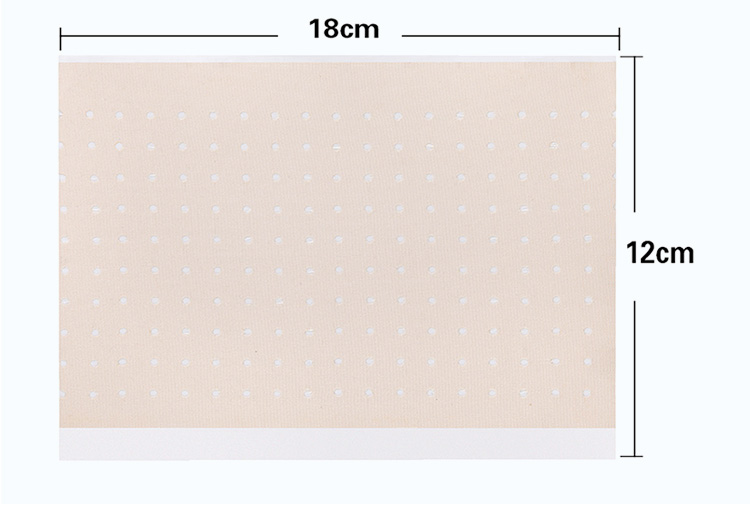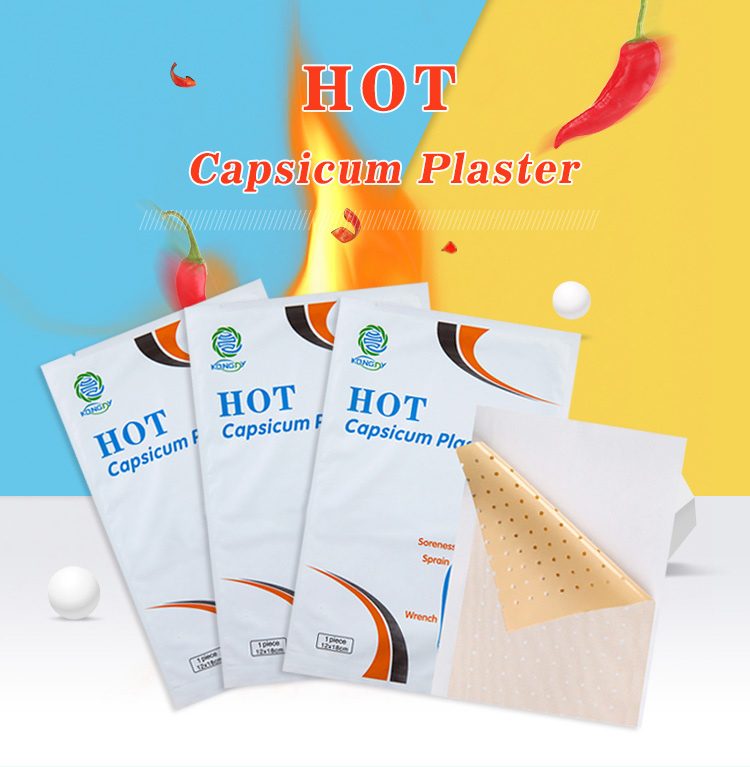How Does Customization Affect the Price of Hot Capsicum Plasters?
When considering the development of Hot Capsicum Plasters for your brand, customization can be a powerful tool for differentiation, but it can also have a significant impact on pricing. Whether you're working with a Hot Capsicum Plaster Manufacturer, an OEM, or developing a Private Label Hot Capsicum Plaster, understanding how various customization factors affect the cost is essential for your budget planning. In this article, we will explore the main elements of customization, such as ingredients, packaging, and design, and discuss how each affects the overall price of Custom Hot Capsicum Plasters.

1. Custom Formulations and Active Ingredients
The first and most significant area of customization involves the Hot Capsicum Plaster formulation. Customizing the formulation allows you to control the level of effectiveness, the specific ingredients, and the overall user experience of the product. Capsicum extract, the primary active ingredient, is crucial for its pain-relieving properties, but additional ingredients like menthol or herbal extracts can enhance the product.
How Custom Ingredients Impact Price:
- Raw Material Sourcing: The cost of sourcing different active ingredients can vary significantly. Capsicum extract is generally affordable, but if you decide to add high-quality or rare ingredients like essential oils, herbal extracts, or enhanced pain-relief agents, the cost of the raw materials will increase.
- Ingredient Concentration: Higher concentrations of active ingredients such as capsicum or menthol often result in a more potent product but will also increase costs. Customizing your Hot Capsicum Plaster to include a higher concentration for added effectiveness will raise the price.
- Regulatory Compliance for Custom Formulas: If you're creating a Custom Hot Capsicum Plaster with unique ingredients, you might need to invest in additional testing and regulatory approval to ensure compliance in your target market, which adds to the cost.
Example:
A basic Hot Capsicum Plaster with a standard capsicum concentration may have a lower price, but a Custom Hot Capsicum Plaster with added herbal extracts and a higher capsicum percentage will see a price increase due to higher ingredient costs and potential additional testing.
2. Packaging Customization
Packaging plays a crucial role in branding and can significantly influence how customers perceive your product. Customizing the packaging of your Private Label Hot Capsicum Plaster can differentiate your brand from competitors, but it also impacts the overall cost.
Types of Packaging Customization:
- Material Choices: The material used for your packaging can vary from simple plastic or paper to eco-friendly or premium materials. Choosing biodegradable or recyclable packaging materials may increase the cost but appeal to environmentally conscious consumers.
- Custom Labeling and Printing: Adding custom designs, logos, and brand-specific information to the packaging is essential for private labeling. Custom labeling, special printing techniques (e.g., embossing, foil stamping), and adding multilingual labels for international markets can raise the cost.
- Packaging Design Complexity: More complex packaging designs, such as custom shapes, tamper-evident seals, or innovative packaging solutions, will increase the overall cost compared to standard packaging formats provided by the Hot Capsicum Plaster OEM.
Example:
A Hot Capsicum Plaster Manufacturer offering standard packaging solutions may have lower prices. However, if you opt for fully customized packaging with premium materials and intricate branding designs, the price will increase accordingly.
3. Minimum Order Quantities (MOQs)
Many Hot Capsicum Plaster Suppliers and OEMs have Minimum Order Quantities (MOQs) that directly influence the cost per unit of customized products. Typically, the higher the quantity you order, the lower the unit price due to economies of scale. However, the level of customization may require higher MOQs.
How MOQ Affects Customization Costs:
- Higher MOQs for Customization: Custom formulations, packaging, or design may require the manufacturer to produce larger quantities to justify the cost of setting up custom production lines, sourcing specific ingredients, or creating unique packaging molds.
- Smaller Runs with Higher Costs: If you need a smaller batch of Private Label Hot Capsicum Plasters with custom features, be prepared for a higher price per unit. Producing fewer units means that the cost of customization, including any specialized processes or materials, will be spread across a smaller quantity, making each unit more expensive.
Example:
A basic, non-custom Hot Capsicum Plaster ordered in large quantities will have a lower per-unit price. In contrast, a highly customized product with specific packaging and formulation will have a higher unit price, especially if the order quantity is lower.
4. Manufacturing Complexity
The level of complexity involved in the manufacturing process also affects the price of Custom Hot Capsicum Plasters. Products that require more advanced production techniques, specialized machinery, or unique ingredients will generally cost more to produce.
Factors Affecting Manufacturing Costs:
- Specialized Equipment: Custom formulations may require specialized equipment or processes that aren't part of the standard manufacturing setup. For example, if you're adding unique ingredients that require precision mixing or a specific encapsulation process, this will increase costs.
- Additional Production Time: Customizations may also add to the production timeline. If your Hot Capsicum Plaster OEM needs to run additional quality checks, testing, or adjust their manufacturing process for your custom product, this will likely increase the labor and time involved, thus raising the overall cost.
Example:
A Hot Capsicum Plaster Supplier offering standard production processes will have lower costs. However, if your Custom Hot Capsicum Plaster requires additional steps in the manufacturing process, such as the inclusion of multiple active ingredients or advanced coating techniques, expect to pay more.
5. Branding and Marketing Costs
When you create a Private Label Hot Capsicum Plaster, you are not only customizing the product itself but also tailoring it to reflect your brand’s identity. This involves costs related to branding and marketing, which can further impact the overall price.
Key Branding Considerations:
- Design and Artwork: Custom branding elements such as logos, color schemes, and promotional designs will incur costs. Professional designers may need to be hired to create packaging that aligns with your brand.
- Marketing Collateral: Customized marketing collateral, including brochures, point-of-sale displays, or online promotional materials, also adds to the price.
- Brand Differentiation: For brands seeking to establish a strong presence in a competitive market, investing in a unique, high-quality Custom Hot Capsicum Plaster product is essential but comes with higher initial costs.
Example:
A standard product with minimal branding will have a lower price point, while a Private Label Hot Capsicum Plaster that involves detailed branding, custom marketing materials, and advanced packaging will result in higher costs due to the investment in brand identity.
6. Supply Chain Considerations
Finally, the logistics and supply chain for custom Hot Capsicum Plasters will also affect pricing. If your custom product requires specialized sourcing, international shipping, or additional steps in the supply chain, these factors will influence the final cost.
Supply Chain Factors:
- Sourcing Specialized Ingredients: If you're customizing the formula and the Hot Capsicum Plaster Manufacturer needs to source specific, hard-to-find ingredients, this could increase lead times and costs.
- Shipping Costs: Custom packaging and formulations might involve different shipping requirements, such as temperature control, that can raise logistics costs.
- Inventory and Storage: If you're ordering larger quantities due to MOQs, you'll need to consider warehousing costs, especially if you're distributing to multiple regions.
Example:
Working with a local Hot Capsicum Plaster OEM might reduce shipping and logistics costs, but if your custom product requires international shipping or specialized handling, you will likely face higher expenses.
Conclusion
Customization can dramatically affect the price of Hot Capsicum Plasters, with costs being influenced by factors such as custom formulations, packaging design, manufacturing complexity, and branding efforts. Partnering with a reliable Hot Capsicum Plaster Manufacturer or OEM that offers transparent pricing and flexibility in customization options is essential for balancing quality and cost. To optimize your budget, consider the level of customization that aligns with your brand’s goals while ensuring that it fits within your pricing structure.
Frequently Asked Questions (FAQs)
1. How does the formulation of a Custom Hot Capsicum Plaster affect the price?
Customizing the formulation by adding ingredients or increasing the concentration of active components will increase the cost due to the need for higher-quality or rare ingredients.
2. Does custom packaging increase the price of Private Label Hot Capsicum Plasters?
Yes, customizing the packaging, especially if you choose premium materials or complex designs, will raise the overall price of the product.
3. What is the impact of Minimum Order Quantities (MOQs) on customization costs?
Higher MOQs typically reduce the cost per unit. However, customization often requires larger MOQs, meaning that if you order in smaller quantities, the cost per unit will be higher.
4. Can branding affect the price of Hot Capsicum Plasters?
Yes, investing in custom branding, including packaging design and marketing materials, will add to the overall price of the product.
5. How do supply chain factors influence the cost of Custom Hot Capsicum Plasters?
Sourcing specialized ingredients, international shipping, and custom warehousing needs can increase supply chain costs, impacting the final product price.






